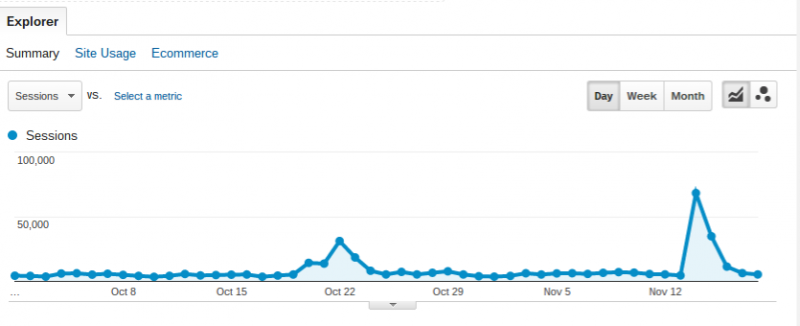
Global Voices web traffic in October and November 2015
Our Facebook Global Voices page is managed by Nevin Thompson and Mohamed Adel. Their mission is to build and engage audiences around Global Voices stories.
By Nevin Thompson and Mohamed Adel
Why is Facebook so important to Global Voices?
Social media plays an important role in sending visitors to the Global Voices website. At the moment about 40 to 50 per cent of our readers arrive on the site from social media.
Seventy-five per cent of those visitors come from Facebook.
So, Facebook plays a key role in making sure Global Voices authors can tell their story to the world.
How does the Facebook algorithm work?
The Global Voices Facebook page has about 76,000 followers. That may seem like a lot, but when we share a post on Facebook not every one of our followers will actually ever see it.
Instead, it's estimated that, thanks to how the Facebook algorithm works, only five to ten per cent of our followers will ever see our Facebook posts.
That's right: when we post a link to a Global Voices story, just a fraction of our followers will see it.
Now, you might see every story we post on our Facebook page, but that's likely because you have chosen to follow Global Voices and so receive updates for everything that is posted on the page.
But a large number of our Facebook followers may not see links to stories.
There's also a flood of content, and a flood of social media posts sharing that content. People just cannot pay attention to everything all the time, and Global Voices Facebook posts are no exception.
So, how can we make sure our stories are going to be read?
How we build engagement and reach
Since Facebook is so important to our social media strategy, the social media team has devoted a lot of time to figuring out how the Facebook algorithm works.
One thing we have noticed: popular posts actually increase the “reach” of other posts.
In other words, if we post a link to a Global Voices story on Facebook, and a lot of people:
- Click “Like”
- Share the post with their friends
- Make a comment in the Facebook post
- Actually click on the link and come to the Global Voices site
…the Facebook algorithm “rewards” the Global Voices Facebook page by allowing us to reach more people on Facebook.
For example, following two horrible nights violence in Beirut and Paris in mid-November, Joey Ayoub's post “The Streets of Paris Are as Familiar to Me as the Streets of Beirut” went viral.
In just a couple of days, Joey's story received 105,000 views on the Global Voices site, making it is our top post of 2015 so far. Seventy-five percent of that traffic was from Facebook.
When we posted a link to Joey's story on Facebook, it quickly became wildly popular:
The Facebook post “reached” more than 250,000 people. As you can see, there were nearly 1,600 “likes” and more than 1,600 shares.
While the likes and shares meant that a flood of visitors were coming to the Facebook site to read the post, the Facebook algorithm also “rewarded” us by boosting the overall reach of our Facebook page for a few days.
Popular Facebook posts help us reach more readers
The “before and after” snapshot below shows how the popularity of Joey's post on Facebook helped us reach a massive number of readers.
The grey line represents how many of our Facebook followers our posts typically reach.
The blue line represents our reach the following day, after we had posted a link on Facebook to Joey's story:
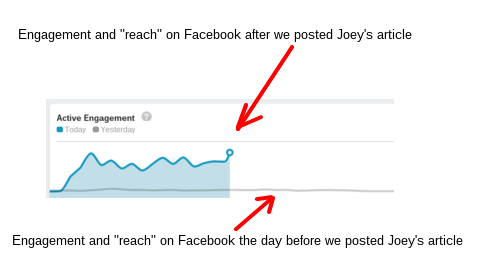
The blue line represents the reach of all of our posts on Facebook that day. The popularity of Joey's story boosted engagement for everything.
Posting popular “evergreen” content on Facebook
Not all of the 5-6 “fresh” stories that Global Voices publishes every day will go viral. In fact, sometimes our posts just won't reach many of our 75,000 Facebook fans. This post only reached about 500 people on Facebook:
However, with a bit of research the social media team can find older “evergreen” Global Voices articles posts that Facebook readers may find appealing and will therefore like and share and click on.
Like its name implies, an “evergreen” post is generally pretty timeless. While it is not “news”, it still features relevant and interesting information that our readers find irresistible.
For example this post by Global Voices Latin America from September, 2015 will continue to be relevant for some time:
It's also still quite popular whenever we post, helping us extend our reach on Facebook.
Evergreen posts are critical for building reach and engagement
There are some evergreen posts that always seem to be popular with our Facebook audience.
The post The Leading Cause of Death in Developing Countries Might Surprise You from January, 2015 receives a significant amount of engagement whenever we have shared it on Facebook over the past year.
The screenshot below shows how many times we have posted it, and how many likes and “clicks” the article received each time.
As you can see, the Facebook likes are just the tip of the iceberg.
There are a lot of clicks compared to likes. These clicks are important (and make Mohamed and Nevin very happy!) because the high number of clicks each time we post indicates people who have actually been motivated enough to click on the link in Facebook and travel to the Global Voices site to read the article:
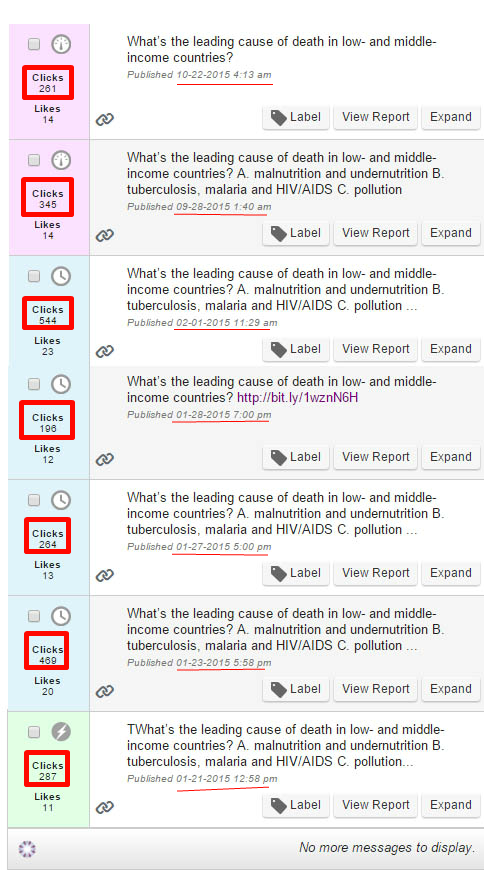
Now, you might argue that we have “overshared” this article, but keep in mind that because of how the Facebook algorithm works, not all of our followers will see this appear in their feeds every time we post it.
The article itself is also relatively timeless over the course of the year, at least until new research is released about life expectancy in low- and middle-income countries.
Keeping social media posts relevant
There is one other reason for posting highly relevant evergreen content: Facebook rewards us by allowing us to reach more people if we keep up a steady stream of posts on the Facebook site.
Making between 12 and 18 posts every day on Facebook seems to be what it takes to keep up momentum on Facebook and continue to reach more and more of our 75,000 followers. Post fewer stories and it means less web traffic for Global Voices.
The challenge, however, is that there are five or six stories published daily by Global Voices writers. So, if we want to post a minimum of twelve stories, at least six stories will be “recycled” evergreen content.
But Global Voices is a news site. Our readers expect us to post about the news, and may be confused if we continually post about old topics and issues.
So, when we do post older evergreen articles, we're always careful to identify when a story has been previously published.
And we're always careful to repost timeless stories that are still highly engaging and relevant.
This way we can maintain a high level of engagement on Facebook while being open about what is new and what has been published before.
Three ways you can help Global Voices on Facebook
Facebook can account for 75% of our social media traffic, and at the moment social media is sending 50 per cent of visitors to the Global Voices site. So, Facebook is a pretty important source of readership.
One area where Global Voices’ social media managers need help is with building a vibrant community on our Facebook page.
Here are three ways you can help us continue to build the Global Voices Facebook community:
- If you see that an article you have written has been shared on the Global Voices Facebook page, share the GV Facebook post with your friends
- Consider liking Global Facebook posts that you find particularly interesting
- Engage in meaningful conversations on the Global Voices Facebook page (this will really help expand our reach!)
Expanding reach by engaging in meaningful conversations
Our friends at PRI Public Radio Internation are actually a great example of fostering community on Facebook. For example in this Facebook post about the private sponsorship of refugees in Canada, the PRI team is working pretty hard to facilitate conversation:
 PRI's Facebook page offers frequent examples of how to engage in conversations.
PRI's Facebook page offers frequent examples of how to engage in conversations.
What the social media team is hoping we can get help with is if authors and editors or even just members of the Global Voices community who are interested in a particular topic can begin or sustain conversations on the Global Voices Facebook page.
On one hand, there is a pragmatic goal: the Facebook algorithm makes sure more people see our posts if more people are commenting on our posts.
But of course there is ultimately a more meaningful goal when engaging on Facebook: building community is the best way to make sure as many people as possible around the world continue to be introduced to Global Voices.
And building community and connections happens in part through conversations. So your help pitching in on Facebook is appreciated!
Finally, if you have any questions or comments about this article please leave a comment below.

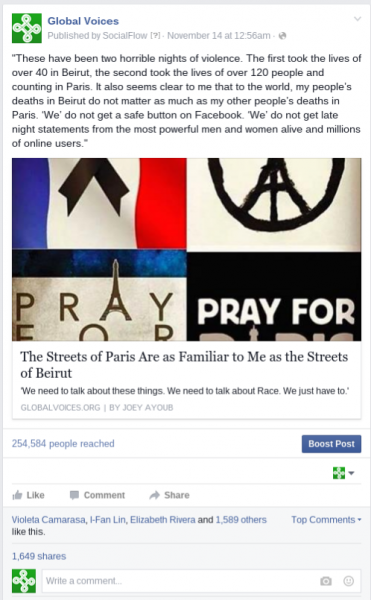
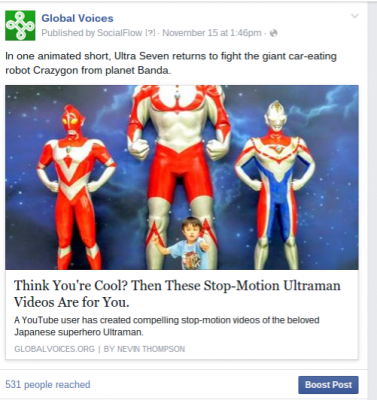




2 comments
The mysteries of Facebook, revealed. Many thanks for posting this, Nevin and Adel!